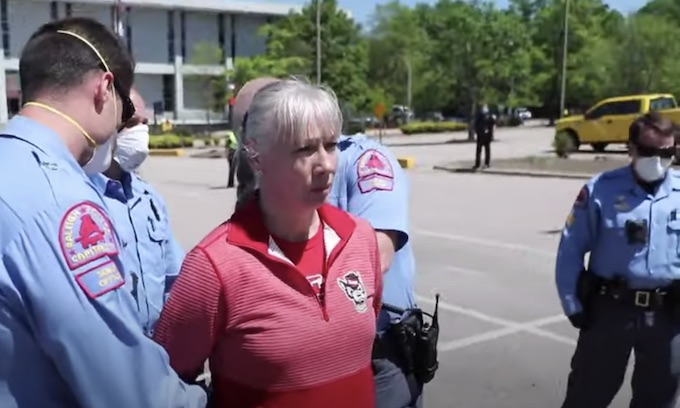RALEIGH — The issue: Were police in the wrong when they arrested at least one protester near the legislature who was accused of violating the statewide stay-at-home order?
Why we’re checking this. The protesters asked for an end to Gov. Roy Cooper’s stay-at-home order, and the reaction from the Raleigh Police Department that “Protesting is a non-essential activity” inspired many angry responses.
Protesting is a non-essential activity.
— Raleigh Police (@raleighpolice) April 14, 2020
I have a permit. pic.twitter.com/nGJExQoZjy
— Courtney Shadegg (@CShadegg) April 14, 2020
What you need to know. During an official emergency, like the coronavirus is in North Carolina, can people be arrested for violating emergency orders while they protest?

GOPUSA Editor’s Note: Please keep in mind that this is a mainstream media story with the typical lean to the left. We publish the story for the purpose of informing our readers.

That’s what happened Tuesday, when the State Capitol Police charged a protester at a “Reopen NC” rally in Raleigh with violating the same stay-at-home order she had come to protest. Afterward, the conservative-leaning group’s supporters called her arrest unconstitutional, leading another police force, the Raleigh Police Department, to send out a tweet defending the charges.
“Protesting is a non-essential activity,” the police tweeted.
There’s no exemption spelled out in state and Wake County stay-at-home orders for protesting like there is for other “essential” activities.
In a statement Tuesday night, the Raleigh Police Department stood by their earlier tweet as well as officers’ obligation to enforce the stay-at-home order during “these unprecedented times and unusual circumstances.”
“But more important is the health and wellness of all who live in our community, including the officers who must engage in circumstances such as these,” the statement said. “We simply want everyone to be safe during this very serious public health crisis.”
What the Constitution says about protests
But what about the Constitution?
Protesting is certainly a constitutionally protected act. The First Amendment guarantees that and more. But those constitutional rights don’t necessarily protect protesters from being arrested for breaking other laws while they protest.
For example, many liberal protesters have been arrested at the state legislature for trespassing in recent years, after refusing police orders to leave. Some have later had their charges dismissed, while others — most notably a frequent protest leader, the Rev. William Barber II — were prosecuted and convicted.
The issue is once again in the spotlight because of the coronavirus pandemic, although more recently it has been conservative-leaning protesters being arrested, not liberal ones.
In addition to the arrest with the Reopen NC protest, anti-abortion protesters were arrested in Greensboro and Charlotte earlier this month. Those arrests have now triggered lawsuits.
Last week, after Texas Republican Sen. Ted Cruz said he thought the arrests of the anti-abortion activists were unconstitutional, The News & Observer wrote a fact-check about that claim.
The fact-check concluded that, as with many legal issues, it depends.
Police do have the power to use criminal charges to enforce Cooper’s stay-at-home order, said Shea Denning, a criminal law expert at the UNC School of Government. And in an officially declared emergency like this, there is much precedent for the government being able to take actions to address the emergency that might in normal times infringe on people’s rights.
The question, then, isn’t a simple one like whether people have a constitutional right to protest. The real question, Denning said, becomes whether the restrictions went too far — or whether the restrictions were enforced in a discriminatory manner.
“I think what people might be thinking about is, ‘Well, don’t I still have constitutional rights? And can a state statute take away my rights?'” Denning said.
The answer, she said, is yes to both: A state of emergency doesn’t completely take people’s rights away, but it does let the government do things that might otherwise infringe on people’s rights.
Although the State Capitol Police made the arrest, the Raleigh Police Department garnered much of the attention Tuesday for its defense of the arrest on social media.
In an emailed statement, Raleigh police said they are “having ongoing conversations with Wake County officials and the Wake County District Attorney’s Office on the scope and enforcement” of both the local stay-at-home order and the statewide order.
The Raleigh Police Department added in its statement: “The Wake County District Attorney is the individual who decides charging language for failure to adhere to the Governor’s Orders and the Wake County Proclamation, when charging is appropriate, and what charges individuals may face for violating either one of these orders.”
The Raleigh Police Department referred questions about the arrest to the State Capitol Police.
Nationwide, the American Bar Association wrote in March, “Lawsuits challenging COVID-19 quarantines and restrictions on public gatherings may be doomed to failure.”
___
(c)2020 The News & Observer (Raleigh, N.C.)
Visit The News & Observer (Raleigh, N.C.) at www.newsobserver.com
Distributed by Tribune Content Agency, LLC.
—-
This content is published through a licensing agreement with Acquire Media using its NewsEdge technology.



















Recent Comments